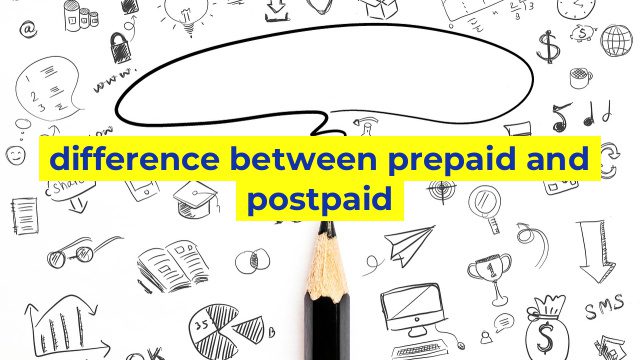Difference Between Prepaid and Postpaid
When it comes to choosing a mobile plan, you have two options – prepaid and postpaid. Both options have their own advantages and disadvantages. In this article, we’ll take a look at the key differences between prepaid and postpaid.
Payment Method
The most obvious difference between prepaid and postpaid plans is the way you pay. With prepaid plans, you pay in advance for the services you will use. You recharge your account with a certain amount of money and then use it as you go. With postpaid plans, you pay for the services you have already used at the end of every month.
Flexibility
Prepaid plans offer more flexibility since you can change your plan or provider at any time. You’re not locked into any long-term contracts, and you can choose how much you want to spend each month. Postpaid plans, on the other hand, usually come with a contract period of 12-24 months, and it can be difficult to change plans or providers without paying fees for breaking the contract.
Simplicity
Prepaid plans are simple and straightforward. You pay for what you use, and it’s easy to keep track of your spending. With postpaid plans, you pay a fixed monthly fee, which includes a certain amount of call time, text messages, and data. If you use more than your allowance, you’ll have to pay extra charges, and it can be difficult to keep track of your spending.
Credit Score
When you sign up for a postpaid plan, the service provider will often check your credit score to determine your eligibility. If you have a poor credit score, you may be required to pay a security deposit or be declined for the plan. With prepaid plans, there is no credit check, and anyone can sign up.
Data Usage
Prepaid plans often offer better value for data usage than postpaid plans. With prepaid plans, you can purchase data packages that offer better value for money than what you would get with a postpaid plan. However, if you’re a heavy data user, you may find that postpaid plans offer more data at a better price.
In conclusion, the choice between prepaid and postpaid plans largely depends on your usage habits and preferences. If you value flexibility, simplicity, and no long-term contracts, then prepaid plans might be the better option for you. If you need more data and want the convenience of a fixed monthly fee, then a postpaid plan may be the way to go.
Table difference between prepaid and postpaid
| Features | Prepaid | Postpaid |
|---|---|---|
| Payment Method | Pay before using | Pay after using |
| Usage Limit | Limited | Unlimited |
| Contract | No contract | Typically requires a contract |
| Billing Cycle | Charged per usage or on a specific time interval | Monthly billing cycle |
| Credit Check | No credit check required | Credit check required |
| Flexibility | Flexible, no commitment to a specific plan | Less flexibility, may have less options for switching plans or cancelling |
| Cost | Higher up-front costs for phone and plan | Lower up-front costs for phone and plan, but may be more expensive long-term if usage is high |


